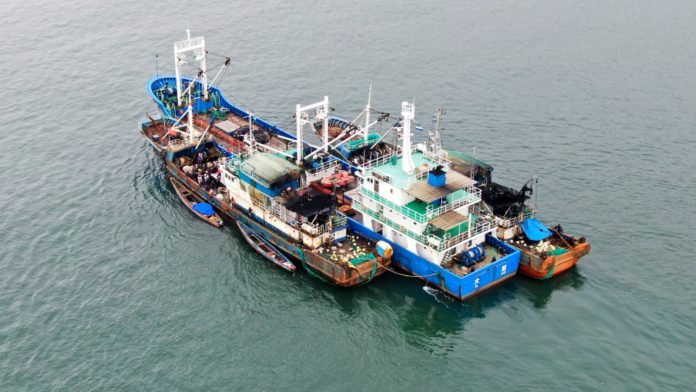
Canoe fishermen and CSOs in the fisheries sector have condemned activities of some trawlers in illegal trans-shipment popularly known as ‘Saiko’ in Ghana’s waters. They are calling for swift action from government to save the sector.
A leading member of the campaign against ‘Saiko’, Kwadwo Kyei Yamoah on Adom FM’s Burning Issue Programme entreated the Fisheries Enforcement Unit to apply the provisions made in Ghana’s Fisheries Law to address this menace.
“Saiko is such a serious problem. Now in Elmina, it’s booming. We have been speaking against it but to no avail. We import $200 million worth of fish annually . If we collapse our fisheries sector it will bring adverse poverty to the people”; Kwadwo Kyei Yamoah Programmes Manager for Friends of the Nation warned.
A fisheries Advocate, Richster Nii Armah Armafio attributed the wild illegal fishing activities to huge over capacity of the current fishing industry.
“I won’t blame those who deal with the ‘Saiko’ business. The fishing industry is over capacitated and that is also causing problems. We have 14, 000 canoes instead of 9, 000. The fishing is all people are doing. There is lack of alternative livelihood for the fishers. In the past people were doing other things like crop farming to supplement their fishing activities which isn’t the case now”; Nii Armah explained.
An executive member of the Ghana National Canoe Fishermen Council, Nii Djamodja believes self- regulation among the fishers must be encouraged. He however bemoaned the countless instances some fishermen tried observing right fishing attitudes just for their gains to be eroded by others who indulged in illegalities. He cited the case of ‘Saiko’ activities as a clear example which even defeats the closed season initiative. He cited that one ‘Saiko’ expedition can bring to shore what ten canoes will do.
“The difficulty of self-regulating is when some comply, and others don’t. It discourages the rest, so the key solution is to punish defaulters severely to serve as deterrence. The issue of illegal fishing must be dealt with holistically; Nii Djamodja stated.
Kwadwo Kyei Yamoah called for right timing for the closed season initiative to achieve the maximum results.
“Just one year of closed season won’t yield the right desire. The right time for the closed season should be pegged between July and September. This is the time researchers and the academia suggest but the people opted for May; Kyei explained.
The discussants explained that the Fisheries Act 625 states the one who catches as well as the one who buys any fish caught illegally is guilty. The need for the public to be educated on the fisheries laws is very important to attain the Sustainable Development Goal 14.4 which is aimed at ending destructive fishing practices.
The fisheries discussion on Burning Issues is under the Far Ban Bo Project with support from the European Union in collaboration with Care International Friends of the Nation and Oxfam.
